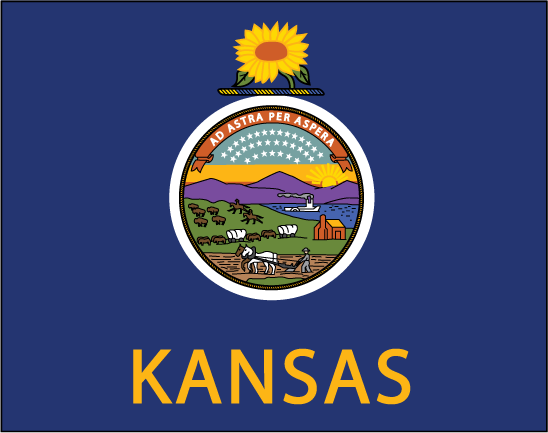Five Populist Congressmen were elected to office during the days of the party's ascendancy, including the brilliant Jerry Simpson of Medicine Lodge, known in Kansas annals as "Sockless Jerry." Simpson, a cattleman who had been ruined by the disastrous blizzard of 1886, was nominated to represent the Seventh Congressional District in 1890; his ability was recognized when he eloquently opposed the platform adopted by the convention, and the platform was revised to conform with his views. He was twice reelected and ably supported all legislation sponsored by his party during his tenure of office.
The Populists repeated their victory with the election of Governor John W. Leedy in 1896 then their power waned. Returning prosperity quieted the political upheaval, and the Populists were eventually reabsorbed by the two main parties, the Democratic and Republican. The latter party, offspring of the Territorial Free Soilers, has, in general, been dominant. Of the 27 Governors to date (1938), only five including Walter A. Huxman (193739) have been Democrats.
Kansas contributed four regiments to the Spanish American War. One of them, the 20th under Colonel Frederick Funston, made a remarkable record in the Philippines; the 23rd, composed of Negroes, was sent to Cuba, arriving in time to see the Spanish depart ; while the other two, the 2ist and 22nd, were trained and held in readiness, but did not leave the.States.
In the 1890's another militant leader appeared on the Kansas horizon:a round faced little woman with a hatchet Carry Nation. Although "dry" in theory, Kansas was still "wet" in fact. Mrs. Nation, driven by her experiences with a drunken husband, set out to remedy the evil. She smashed saloons with zeal and won for herself a permanent place in history, although her actual accomplishments were little more than a ripple on the pool of the State's "wetness." The problem of liquor is still vexing. In 1937 the State legislature legalized the manufacture and sale of beer of 3.2 per cent alcoholic content. Sterner liquors, although legally banned,are frankly in evidence in many communities.
In other matters the State government has proved competent. In 1883 when the railroads, grown exceedingly wealthy, threatened to become autocratic, the State executive council elected a board of railroad commissioners to curb their power by fixing freight and passenger rates and regulating working conditions. A special session of the legislature was called in 1884 to deal with the foot and mouth disease that was scourging Kansas cattle. In 1889 the eight hour labor law was enacted and the first Monday of September set aside for the observance of "Labor Day." In 1894 a board of irrigation was appointed and an appropriation of $30,000 was made for irrigation experiments.

